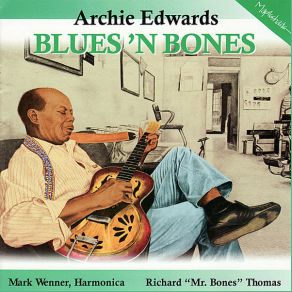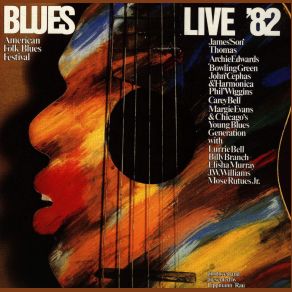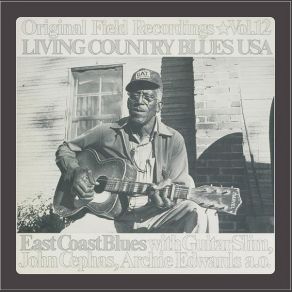Archie Edwards
Wikimp3 information about the music of Archie Edwards. On our website we have 5 albums and 9 collections of artist Archie Edwards. You can find useful information and download songs of this artist. We also know that Archie Edwards represents Blues genres.
Biography
[Edit]From the time of his birth in rural Virginia in 1918, Piedmont blues guitarist Archie Edwards was surrounded by music. The hard work of farm life was punctuated by musical interludes when musicians from the town of Union Hall and surrounding areas visited to make music with his father, Roy Edwards, who played the slide guitar, harmonica, and banjo. By the time he had entered his teenage years, Edwards knew that he wanted to be a guitarist. Within a few years, he had one of his instruments to play, but the guitar was one he had to share with two brothers, Willie and Robert. He built up his repertoire by listening to recordings made by such blues legends as Blind Boy Fuller and Blind Lemon Jefferson. He also increased his musical knowledge by learning at the elbow of men like his father and other musicians who occasionally traveled through town and the neighboring areas. Edwards and his brothers earned pocket money by playing local house parties. At the time, Edwards was just a boy of 12. He didn't return to school after the eighth grade, but instead sought employment alongside another brother. The Edwards siblings toiled in a sawmill, with the guitarist continuing to appease his lifelong love of music during rare downtimes by playing around the camp, where he also labored on Saturday mornings. In the evenings after work, Edwards strummed his guitar during house parties. But by 1937, the guitarist had had enough of the sawmill. He left the area and ended up in New Jersey, where he supported himself for several years by chauffeuring and cooking before heading home. Later, he found employment at an Ohio hotel. During World War II, the guitarist enlisted and served his time as an MP overseas. When the war was over, he made his way to the nation's capital, where he undertook the trade of a mason. Dissatisfied, he left for Virginia again, this time settling in the city of Richmond where he worked as a barber. Still unsettled, he headed back to Washington where, before he retired during the early '80s, he would work as a federal security guard. He also drove a truck and opened a barbershop in the late '50s. The storefront attracted men who loved the blues as much as he did. One of Edwards' frequent visitors was a musician he had revered since his youth, Mississippi John Hurt. The two blues lovers quickly forged a bond of friendship and they played around the capital with another blues musician, Skip James. Beginning in 1966 with the death of his idol Hurt, Edwards' music was silenced for several years when he could not play, perhaps due to grief. Following this period of mourning, he went on to pen "The Road Is Rough and Rocky." He later performed at festivals and local nightspots, and he appeared during a festival sponsored by the Smithsonian. He also appeared around Washington with an ensemble known as the Travelling Blues Workshop. The outfit included Flora Molton, Mother Scott, John Jackson, Phil Wiggins, and John Cephas. Thanks to Molton, Edwards got the chance to record. She passed his name to Alex Kustner, who booked Edwards onto the American Blues Festival across Europe. L&R soon scooped him up to record Living Country Blues, Vol. 6: The Road Is Rough and Rocky. He also recorded for Mapleshade in the late '80s. He went on to team with Molton and Eleanor Ellis, and the three partners toured Europe and North America.
Title: Living Country Blues USA Vol. 6 - the Road Is Rough and Rocky
Artist: Archie Edwards
Genre: Blues
Title: Piedmont Blues Meets Mississippi Delta Blues
Artist: Dr. Ross, Archie Edwards
Genre: Acoustic
Collections
Title: American Folk Blues Festival '82
Genre: Blues
Title: Living Country Blues USA, Vol. 10 - Country Boogie
Genre: Blues
Title: Living Country Blues USA Vol. 12 - East Coast Blues
Genre: Blues
Title: The Introduction to Living Country Blues USA
Genre: Blues
Title: American Folk Blues Festival 1982
Genre: Blues
Title: Classic Appalachian Blues from Smithsonian Folkways
Genre: Blues
Title: Classic Piedmont Blues From Smithsonian Folkways
Genre: Blues, World Music, Pop, Acoustic, Folk


















